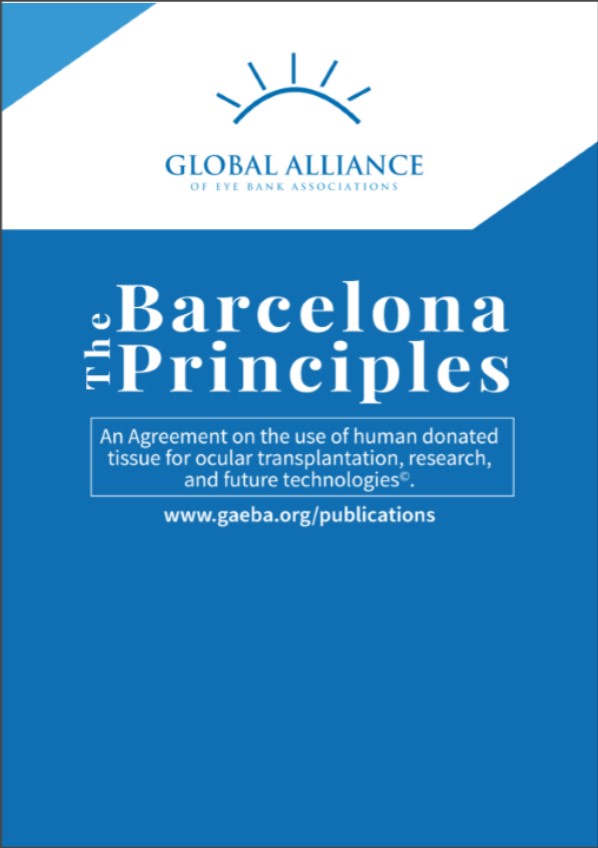Barcelona Principles: global eyecare community unveil new ethical agreement for use of eye tissue
Barcelona - Thursday 14th June 2018. Yesterday, we unveiled the world’s first global Agreement on the use of donated human tissue for ocular transplantation, research, and future technologies.
Named Barcelona Principles, the launch took place at an event hosted by Agreement Partners, and local hosts - Centro de Barraquer Ophthalmology Centre and Barcelona Tissue Bank - in the presence of representatives of the Catalan Government. The Barcelona Principles were launched in the presence of the Ministry of Health for Catalonia, Dr Jose Nunez – WHO Medical Products of Human Origin Service Delivery and Safety Department, and Dr Paul Dubord Ophthalmologist and WHO Expert Advisory Panel on Human Cell, Tissue & Organ Transplantation.
Go to the Barcelona Principles: http://www.gaeba.org/publications/
About the Barcelona Principles
“The Barcelona Principles” says Global Alliance of Eye Bank Association Representative, Associate Professor Graeme Pollock, “has evolved due to the global community seeking guidance on current ethical dilemmas - where they seek to improve tissue access to millions of waiting recipients - without compromise of their personal moral integrity and professional Custodian responsibilities to the donor, recipient and the extended community. “The Barcelona Principles focus on 9 key strategies, informing on the management of altruistic and voluntary donations; their subsequent utility within ophthalmology and research; their retention as a public resource for the shared benefit of all; and their accessibility by waiting recipients. “Collectively, the Barcelona Principles support nations and regions to tackle allocation and equitable access issues in their own jurisdiction, aiding policy and practice development, and recommendations for cross-border engagement1, 2. “The Barcelona Principles also address areas of ethical ambiguity – namely profitization and supply chains to for-profits, and their use in research and product development. “The global community is concerned about the emergence and development of a “market mentality” around donations, and the Barcelona Principles include clear statement - that it is our collective responsibility to protect and retain stewardship of altruistic donations as a public resource for the shared benefit of all3”, says A.Prof Pollock.
The Agreement's key 9 Strategies
The Agreement’s key 9 Strategies include:
1. Respect the autonomy of the donor and their next-of-kin in the consent process.
2. Protect the integrity of the altruistic and voluntary donation and its utility as a public resource for the shared benefit of all.
3. Support sight restoration and ocular health for recipients
4. Promote fair, equitable and transparent allocation mechanisms
5. Uphold the integrity of the custodian’s profession in all jurisdictions
6. Develop high-quality services that promote ethical CTO management, traceability, and utility
7. Develop local/national self-sufficient services
8. Recognise and address the potential ethical, legal and clinical implications of crossborder activities
9. Ensure ethical practice and governance of research (non-therapeutic) requiring cells, tissue and/or organs.
Note: The Barcelona Principles Adhere to the World Health Organization’s Guiding Principles on Human Cell, Tissue and Organ Transplantation.
The Barcelona Principles were developed in partnership with the Global Alliance of Eye Bank Associations (Lead), International Council of Ophthalmology, International Agency for the Prevention of Blindness, The Cornea Society, and in regions without eye bank representation, and in regions without an eye bank association, ophthalmology societies such as the Ophthalmology Society of the West Indies, and the Pacific Eye Care Society.


